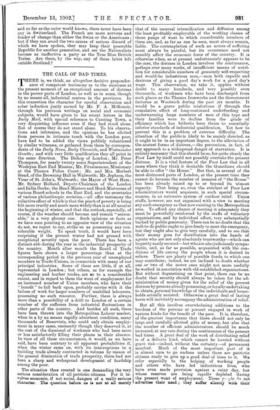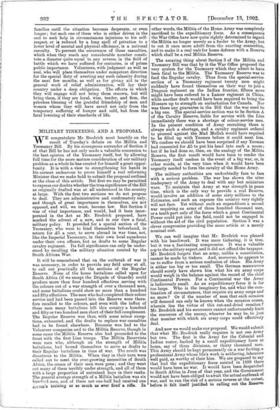THE CALL OF BAD TIMES. T HERE is, we think, an
altogether decisive preponder- ance of competent testimony as to the existence at the present moment of an exceptional amount of distress in the poorer parts of London, as well as in some, though by no means all, industrial centres in the provinces. In this connection the character for careful observation and sober induction justly earned by Mr. F. A. McKenzie, through his previous writings on social and economic subjects, would have given to his recent letters in the Daily Mail, with special reference to Canning Town, a very disquieting influence even if they had stood alone. But of course they do not stand alone. To his observa- tions and inferences, and the opinions he has elicited from persons in intimate touch with the London poor, have had to be added the views • publicly volunteered by similar witnesses, or gathered from them by correspon- dents of the Daily News, Daily Chronicle, and Westminster Gazette; and with very little qualification they all point in the same direction. The Bishop of London ; Mr. Peter Thompson, for nearly twenty years Superintendent of the Wesleyan East End Mission; Mr. Fitzsimmons, Missionary at the Thames Police Court; Mr. and Mrs. Herbert Stead, of the Browning Hall in Walworth; Mr. Jephson, the Vicar of St. John's, Walworth ; the Mayor of West Ham ; Mr. Sydney Holland, Deputy-Chairman of the London and India Docks; the Head-Masters and Head-Mistresses of various Board-schools in the East End, and the secretaries of various philanthropic societies,—all offer testimony the collective effect of which is that the pinch of poverty is being felt more cruelly and much more widelythan is at all usualat the beginning of winter, and that the outlook, especially, of course, if the weather should become and remain "season- able," is a very gloomy one. Such opinions or facts as we have seen pointing to an opposite view of the situation do not, we regret to say, strike us as possessing any con- siderable weight. To speak truth, it would °have been surprising if the present winter had not pressed with exceptional severity upon the poor. There has been a distinct ebb during the year in the industrial prosperity of the country. Month after month the Board of Trade figures have shown a larger percentage than at the corresponding period in the previous year of unemployed members in Trade-Unions, in connection with many of our principal industries. Some of these are little, if at all, represented in London ; but others, as for example the engineering and leather trades, are so to a considerable extent, and in regard to them the want of employment for an increased, number of Union members, who have their " benefit " to fall back upon, probably carries with it the failure of work for larger numbers of unskilled labourers, possessing no such resource. Further, there is always more than a possibility of a drift to London of a certain number of the sufferers from industrial fluctuations in other parts of the country. And besides all such, there have been thrown into the Metropolitan Labour market, when in a by no means rapidly absorbent condition, many thousands of Reservists, who could only obtain employ- ment in many cases, eminently though they deserved it, at the cost of the dismissal of workmen who had been more or less satisfactorily filling their places in their absence. In view of all these circumstances, it would, as we have said, have been contrary to all apparent probabilities if, when the winter came on, with its interruptions to a building trade already contracted in volume by reason of the general diminution of trade prosperity, there had not been a sharp and widespread development of hardship among the poor.
The situation thus created is one demanding the very serious consideration of all patriotic citizens. For it in- volves economic, if not social dangers of a, really serious character. The question before us is not at all merely that of the unusual intensification and diffusion among the least profitably employable of the working classes of those pangs of want to which considerable numbers of them are, and, as far as can be seen, must always remain, liable. The contemplation of such an access of suffering must always be painful, but its occurrence need net sensibly affect the economic force of the country. It is otherwise when, as at present unfortunately appears to be the case, the distress in London involves the continuance, , perhaps over many weeks, of insufficient means of nutri- tion for considerable numbers of genuinely self-respecting - and would-be industrious men,—men both capable and desirous of giving a good day's work for a good day's wage. This observation, we take it, applies without doubt to many hundreds, and very possibly even thousands, of workmen who have been discharged from such places as the Thames Ironworks and the Government factories at Woolwich during the past six months. It would be a grave public misfortune if through the cumulative effect of long-continued underfeeding and underwarming large numbers of men of this type and their families were to decline from the grade of efficiency which has hitherto been theirs to essentially inferior standards of industrial qualification. Yet how to prevent this is a problem of extreme difficulty. The attention of the public is likely to be mainly directed, as it ought to be in an important degree, to the alleviation of the azutest forms of distress,—the prevention, in fact, of any approach to a widespread danger of starvation. It is entirely necessary that this should be so, for quite clearly the Poor Law by itself could not possibly overtake the present distress. It is a vital feature of the Poor Law that in all cases where they think it desirable the Guardians should be able to offer "the House." But that, in several of the most distressed parts of London, at the present time they cannot do because the number of inmates of "the House" has been already raised up to or beyond its utmost capacity. That being so, even the strictest of Poor Law administrators would acquiesce, in such special circum, stances, in an extensive system of outdoor relief. Union staffs, however, are not organised with a view to meeting any such emergency as that now existing in the Metropolitan area. To afford any chance of meeting it adequately they must be powerfully reinforced by the staffs of voluntary organisations, and by individual effort, very substantially backed by public generosity. There can be no doubt that the well-to-do public ought to give freely to meet the emergency, but they ought also to give very carefully, and to see that their money goes for distribution into the hands of agents who are not only absolutely trustworthy—which can be pretty easily secured—but who are also judiciously sympa- thetic, and, as far as possible, acquainted with the con- ditions of life among the people whom it is desired to relieve. There are plenty of possible funds to which one may contribute; indeed, we are inclined to doubt whether one or two of the newer ones might not more usefully be worked in association with old-established organisations. But without dogmatising on that point, there can be no doubt that security should always be taken for the ad- ministration of money given for the relief of the present distress by persons already possessing, or loyally undertaking to obtain, personal knowledge of the individuals and house- holds actually assisted. Otherwise a great deal of lasting harm will inevitably accompany the administration of relief.
But all this involves overwhelming additions to the. burdens of the persons at present engaged in work of various kinds for the benefit of the poor. It is, therefore, of the greatest importance that there should not only be large and carefully allotted gifts of money, but also that the number of efficient administrators should be much increased, at any rate during the continuance of the present bad times. A great deal of the work of distributing relief is of a delicate kind, which cannot be hurried without grave risk—indeed, without the certainty—of permanent mischief. Much of the most important part of it is almost sure to go undone unless there are patriotic citizens ready to give up a good deal of time to it. We refer especially to the helping of working people and others who have led industrious lives, who have even made provision against a rainy day, but whose reserves are being rapidly depleted during the present want of employment. These p° pie do not advertise their need ; they suffer silently with their families until the situation becomes desperate, or even longer; but each one of them who is either driven in the end to seek help in circumstances injurious to his self- respect, or is reduced by a long spell of privation to a lower level of mental and physical efficiency, is a national casualty. To prevent the occurrence of these casualties, which when they reach any considerable number consti- tute a disaster quite equal to any reverse in the field of battle which we have suffered for centuries, is of prime public importance. Volunteers, with judgment as well as zeal, who will place themselves under competent direction for the special duty of averting any such calamity during the next few months, as well as for giving aid in the general work of relief administration, will lay their country under a deep obligation. The efforts in which they will engage will not bring them renown, but will bring them, if they are loyal, wise, tender, and firm, the priceless blessing of the grateful friendship of men and women whom they will have saved not only from the temporary suffering of hunger and, cold, but from the fatal lowering of their standards of life.



















































 Previous page
Previous page